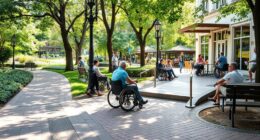Wellness trends are revolutionizing elderly care by focusing on holistic health, leveraging technology, and personalizing approaches. You'll find telehealth services making healthcare accessible, while wearable devices enhance safety and activity tracking. Mental health support is gaining importance, alongside community engagement that fosters connections. Sustainable practices are also on the rise, improving overall quality of life. If you keep exploring, you'll uncover even more exciting trends shaping the future of elderly care.
Key Takeaways
- Holistic wellness programs, combining physical, mental, and emotional health, enhance the overall well-being of seniors through personalized care plans and activities.
- Integration of technology, including telehealth and wearable health devices, improves safety, health monitoring, and healthcare efficiency for elderly individuals.
- Fall detection features in wearable devices significantly reduce emergency room visits and provide timely alerts to caregivers during emergencies.
- Community and social engagement initiatives foster connections among seniors, reducing loneliness and enhancing quality of life through scheduled events and intergenerational programs.
- Sustainable practices in senior living promote environmental health and well-being, contributing to a more satisfying living environment for older adults.
Emphasis on Holistic Wellness

As you explore elderly care options, you’ll notice a growing emphasis on holistic wellness that prioritizes the interconnectedness of physical, mental, and emotional health. This approach recognizes that true well-being goes beyond just managing illness. Incorporating top wellness practices for seniors, such as mindfulness meditation, gentle exercise, and balanced nutrition, can significantly enhance overall quality of life. These practices not only support physical health but also foster mental clarity and emotional resilience, allowing seniors to maintain a sense of independence and purpose. By nurturing all aspects of well-being, caregivers can create a more comprehensive and fulfilling care experience that truly honors each individual’s unique needs and preferences.
Many senior care facilities now offer wellness programs that include fitness classes, meditation sessions, and dedicated mental health support. These initiatives not only enhance residents' quality of life but also promote social interaction.
Activities like group exercises and communal meals are key in combating loneliness and supporting mental health. By integrating regular healthcare services and personalized care plans into daily living, holistic wellness has become a standard expectation, ensuring that each individual's unique health and lifestyle needs are addressed effectively. Additionally, effective relaxation techniques such as deep breathing exercises and mindfulness meditation can further enhance emotional well-being among seniors.
Integration of Technology in Care

Holistic wellness in elderly care isn't just about physical and emotional health; it also embraces the role of technology in enhancing overall well-being.
By integrating innovative solutions, you can considerably improve the quality of care for seniors. Here are some key technologies making a difference:
- Telehealth Services: Access medical consultations from home, reducing the need for in-person visits.
- Smart Home Devices: Fall detection systems and medication dispensers enhance safety and promote independence.
- Wearable Health Devices: Track activity and receive emergency alerts, allowing seniors to monitor their health proactively.
- Remote Monitoring Solutions: Real-time tracking of essential signs enables timely interventions and decreases hospital readmissions.
Additionally, understanding financial considerations for elderly care is crucial for families to effectively plan for these technological solutions.
These advancements make healthcare more efficient and responsive, ultimately supporting a healthier, happier life for seniors.
Personalized Care Approaches

When it comes to elderly care, personalized approaches can greatly enhance a senior's quality of life. By focusing on personalized care, you can tailor non-medical services to meet their unique needs, preferences, and cultural backgrounds. This customization not only boosts satisfaction but also promotes overall well-being.
For instance, meal preparation can align with individual dietary requirements while considering personal tastes. Structured activities that engage seniors in beloved hobbies can markedly improve their emotional health, sparking joy and connection. Additionally, incorporating digital literacy programs into care plans can further empower seniors to connect with loved ones and reduce feelings of isolation.
Additionally, individualized support strategies have proven effective in achieving better health outcomes. As families increasingly seek solutions that honor seniors' individuality, the demand for personalized care plans continues to grow, ensuring a more meaningful and fulfilling aging experience.
Rise of Telehealth Services

Telehealth services are transforming elderly care, making healthcare more accessible and convenient for seniors. As technology advances, you can expect a significant rise in telehealth adoption among seniors by 2024.
Here are some key benefits:
- Virtual consultations allow you to receive timely medical advice from the comfort of your home.
- Remote monitoring enables healthcare providers to track your essential signs in real-time, improving chronic condition management.
- Enhanced communication between caregivers and healthcare professionals leads to better health outcomes.
- Telehealth minimizes hospital readmissions by facilitating timely interventions and follow-ups.
These advancements not only provide crucial care but also empower seniors to maintain independence, ensuring you stay healthy without unnecessary travel or stress.
Community and Social Engagement

Community and social engagement plays an essential role in enhancing seniors' mental and emotional well-being. By participating in diverse social activities, you can build connections and reduce feelings of loneliness. Intergenerational programs in your community encourage interactions with younger generations, enriching both your lives. Volunteer work and educational programs provide a sense of purpose while enhancing social connectivity. Facilities with shared spaces, like communal gardens, foster a vibrant sense of community. Regularly scheduled events markedly improve your quality of life, promoting active participation. Engaging in activities that encourage educational and skill-building toys can also stimulate cognitive functions and enhance social interactions.
| Activities | Benefits |
|---|---|
| Intergenerational Programs | Mutual understanding and enrichment |
| Volunteer Opportunities | Sense of purpose and fulfillment |
| Communal Spaces | Enhanced social interaction |
| Scheduled Events | Improved quality of life |
Adoption of Smart Home Innovations

As technology continues to evolve, adopting smart home innovations can markedly enhance the quality of life for seniors.
These advancements not only foster independent living but also provide peace of mind for families.
Here are some key benefits of smart home technology:
- Medical Alert Devices: Seniors can call for help easily, guaranteeing immediate assistance during emergencies.
- Health Monitors: Devices track essential signs, helping caregivers manage health effectively.
- Medication Dispensers: These guarantee timely and accurate medication intake, reducing errors.
- Remote-Controlled Environments: Lighting and temperature adjustments allow seniors to control their comfort effortlessly.
Additionally, many smart home devices include energy monitoring features, which help reduce utility bills while enhancing overall home efficiency.
With these innovations, seniors enjoy greater autonomy while feeling secure in their homes, making daily life more manageable and enjoyable.
Focus on Mental Health Support

While many people focus on physical health, mental well-being is equally essential for seniors. Increased recognition of the importance of mental health support has led to integrating screenings and counseling into care plans. This addresses challenges like loneliness, depression, and anxiety, promoting a holistic approach to senior care.
Programs designed to foster social interaction are fundamental in combating feelings of isolation. Additionally, activities like art therapy and mindfulness sessions promote mental stimulation, enhancing cognitive function. Research shows that proactive mental health support greatly boosts the overall quality of life for seniors. Moreover, studies indicate that self-awareness can significantly enhance emotional well-being, helping seniors navigate their mental health challenges more effectively.
As part of a thorough wellness strategy, many senior care facilities now include mental health resources, acknowledging that emotional well-being is critical for both physical health and longevity.
Use of Wearable Health Devices

Wearable health devices are revolutionizing how you monitor your health, offering features like real-time health tracking and fall detection.
These tools not only alert you to potential issues but also empower you to stay active and engaged in your wellness journey.
As technology advances, these devices are becoming essential for enhancing safety and health management in your daily life.
Health Monitoring Capabilities
With the rise of technology, seniors now have access to wearable health devices that allow for real-time monitoring of essential signs like heart rate and blood pressure.
These wearable health devices enhance health monitoring capabilities, helping seniors maintain their independence.
Here are four key features you'll appreciate:
- Vital Sign Tracking: Monitor heart rate, blood pressure, and oxygen saturation effortlessly.
- Medication Reminders: Receive timely alerts to guarantee medications are taken as prescribed.
- Activity Tracking: Encourage physical activity, promoting overall health and well-being.
- Emergency Alerts: Instantly notify caregivers in case of significant health changes.
With these advancements, seniors can confidently manage their health and stay active, improving their quality of life.
Fall Detection Features
As seniors continue to embrace technology for better health management, fall detection features in wearable health devices play an essential role in ensuring their safety.
These fall detection devices utilize advanced sensors, like accelerometers and gyroscopes, to automatically identify falls and alert caregivers. This markedly enhances senior care, allowing for quicker responses in emergencies.
Studies show that seniors using these wearables experience a 30% reduction in emergency room visits related to falls, emphasizing their effectiveness in preventing serious injuries.
Some devices even send real-time alerts to family members or emergency services, ensuring immediate assistance.
As of 2023, the market for these devices is set to grow, driven by increased awareness of fall-related risks in healthcare delivery.
Sustainable Practices in Senior Living

Sustainable practices in senior living are transforming communities, creating not just eco-friendly environments but also enhancing residents' quality of life. By incorporating these practices, you're promoting health and wellness while fostering a stronger sense of community.
Here are some key sustainable initiatives:
- Energy-efficient designs reduce utility costs and environmental impact.
- Eco-friendly landscaping promotes biodiversity, offering healthier outdoor spaces.
- Waste reduction programs like composting and recycling minimize landfill contributions.
- Locally sourced meal options support local farmers and provide healthier choices.
These sustainable practices not only benefit the environment but also contribute to the overall satisfaction and well-being of seniors living in these communities.
Embracing such initiatives creates a vibrant, responsible, and nurturing atmosphere for everyone involved.
Enhanced Caregiver Support and Resources

Enhanced caregiver support is essential in helping you navigate these difficulties. While caring for an elderly loved one can be rewarding, it often comes with challenges that require ample support and resources. Online support groups and training resources provide important guidance and foster a sense of community. Respite care options allow you to take necessary breaks, effectively managing caregiver burnout while ensuring your loved one receives quality care. Organizations like Amada Senior Care offer tailored support and resources, enriching the lives of both seniors and their families. With access to educational materials and support networks, you can balance your caregiving responsibilities with personal and professional obligations, making a significant difference in your caregiving experience. Additionally, practicing positive energy can help improve your resilience and overall well-being as a caregiver.
Frequently Asked Questions
What Is the Trend in the Elderly Care Market?
The trend in the elderly care market is shifting towards more personalized and technology-driven solutions.
You're seeing an increase in home-based care options, allowing seniors to age in place with comfort and safety.
Telehealth and remote monitoring are making it easier to access healthcare, while smart home technologies are enhancing independence.
This approach prioritizes not just physical health, but also mental and emotional well-being, creating a more holistic care experience for seniors.
How Can Wellness Be Maintained Among the Elderly?
You might think maintaining wellness is just about physical health, but it's so much more.
To truly thrive, engage in regular fitness classes and meditation sessions that boost both body and mind.
Don't overlook the emotional side; join community activities that spark joy and reduce loneliness.
Routine health screenings can catch issues early, while nutritious meals cater to your needs.
What Are the 8 Needs of the Elderly?
When considering the needs of the elderly, you should focus on social engagement to reduce loneliness, tailored physical health programs, and emotional support to address challenges like grief.
Nutrition's essential, too, as you'll want to guarantee personalized meal planning aligns with their dietary needs.
Additionally, prioritizing safety through smart home technology can enhance their independence.
Regular health screenings help prevent chronic diseases, making these elements critical for their overall well-being.
What Is the Biggest Concern for the Elderly Today?
When you think of the elderly experience, feelings of fear, frustration, and loneliness often loom large.
Today, the biggest concern for seniors like you is mental health, with isolation impacting overall well-being. A staggering 43% of older adults report feeling alone, which can lead to deeper issues like depression and anxiety.
Addressing these emotional challenges is essential, as fostering connections and community support can dramatically enhance your quality of life.
Conclusion
As you embrace these wellness trends in elderly care, think of them as the golden threads weaving a tapestry of hope and liveliness. By prioritizing holistic approaches and leveraging technology, you're not just caring for seniors—you're enriching their lives. Just as the sun rises each day, illuminating fresh possibilities, your commitment to personalized care and community engagement can spark joy and connection in their golden years. Together, let's create a brighter, healthier future for our elders.









